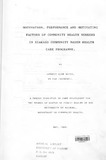| dc.description.abstract | Lack of a reward system for community health workers (CHWs) is of major concern in many community based health care programmes as this reduces the effectiveness of CHWs or makes them stop work. This study was meant to give a starting point in laying down guidelines for a systematic reward system, for the CHWs, when planning the implementation of a community based health care (CBHC) programme.
The study was carried out in the Siakago CBHC programme in Embu District, of Kenya. The programme was started in 1986 through the Ministry of Health and World Health Organization collaboration. Training of community health workers was started during the last half of 1986. By the time of the study 110 CHWs had been trained in 89 villages in Siakago Division. 55 CHW-areas were visited in which 52 CHWs and 549 community members were interviewed. 5 (9.6%) of the CHWs had Left work, cumulatively since the incept ion of the programme, among those interviewed. 3 of the CHWs could not tie traced.
The case study took advantage of the variability of the characteristics among the CHWs and the community members. The conclusions based on the findings of the study are:
1• The CHWs were highly motivated despite the lack of
cash, materiaL and labour support from the members of their village and the programme organizers.
2. The motivating factors that were abundant .among the CHWs were: high social status; history of a
traditional healer in the family; support by family; support by village health committee; support by the local health services staff and; support by the local leaders or administrators.
3. Majority of the CHWs who had expected to get improved village health status; improved social status and new health knowledge and skills had the expectations satified.
4. The Ievel of performance of the CHWs increased with the level of motivation.
5. The community members were willing to support their CHWs by giving them cash, material and labour rewards. The ability of the community members to support their CHWs was limited by the fact that they were low in resources, Siakago being in a low-agricultural potential zone. Yet the reward expectations of the majority of the CHWs can be satisfied by what the community members can be able to contribute.
Therefore, the community members, local leaders or administrators, and local health services staff would approve of the use of community resources to establish a reward system for the CHWs. | en_US |



